Backpacking Jordan has long been a dream, yet it usually seems quite impossible to travelers on the tightest of budgets. In reality, with some insider knowledge and cunning planning, it’s quite possible to take in this breathtaking country without one having to break their bank. From the moment of arrival in Amman, the warm welcome and rich history hit you:.
Jordan will provide you, the poor backpacker that you are, with fascinating culture, great street food, and iconic sites such as Petra and Wadi Rum. The best part? You won’t have to give up comfort or safety to affordably do so. A little bit of creativity and flexibility go the distance in finding ways to save money on accommodation, transportation, and activities fitting both your style and budget.
In this blog, we share with you our best tips and tricks for backpacking Jordan on a broke budget. From accommodation options, street food, and drinks to everything in between-whether you’re a seasoned backpacker or you’re just starting to plan your next adventure-we’ll show you how to make the most of your time in Jordan without setting your wallet on fire. So pack your bags, take your sense of adventure, and dive on into the ultimate guide to Broke Backpacking Jordan!
One important thing to note when traveling to Jordan is that cash is king. Due to a corrupt exchange rate, credit cards are often charged exorbitant fees, making it a costly choice for travelers. To avoid getting ripped off, it’s best to use Jordanian Dinars (JOD) for most transactions. You can exchange your money at a local bank or currency exchange office, but be aware that the rates may vary. Additionally, many small shops, street food vendors, and taxi drivers only accept cash, so it’s essential to have some local currency on hand. By using cash, you’ll avoid the hefty credit card fees and make the most of your money in Jordan.
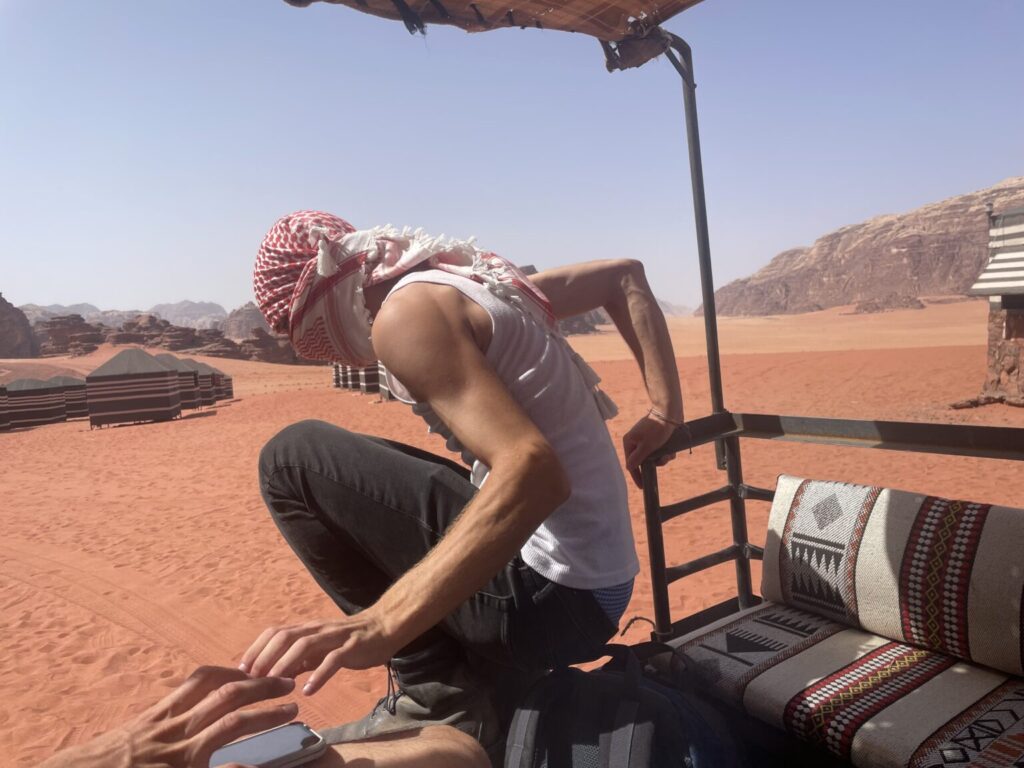
How to get there:
Israel and Palestine:
- From Tel Aviv or Jerusalem, take bus #444 or #446 to the Jordan River border crossing.
- From the border, take a taxi or bus to Amman.
- From Eilat take a bus till the border and walk over, its about a 2 hour drive from there to Petra.
Syria:
- From Damascus, take a bus to the Nassib border crossing.
- From the border, take a taxi or bus to Amman.
Iraq:
- From Baghdad, take a bus to the Trebil border crossing.
- From the border, take a taxi or bus to Amman.
Saudi Arabia:
- From Riyadh or Jeddah, take a bus to the AQABA border crossing.
- From the border, take a taxi or bus to Amman.
When to go:
Spring (March to May)
- Weather: Mild and sunny
- Pros: Comfortable temperatures, wildflowers in bloom, fewer tourists
- Cons: Some sites may still be closed after winter
Summer (June to August)
- Weather: Hot and dry
- Pros: Longer days, festive atmosphere, beach activities
- Cons: Scorching temperatures, peak tourist season
Autumn (September to November)
- Weather: Warm and sunny
- Pros: Comfortable temperatures, harvest season, fewer tourists
- Cons: Some sites may be closed for maintenance
Winter (December to February)
- Weather: Cool and rainy
- Pros: Low prices, Christmas markets, skiing in Aqaba
- Cons: Some sites may be closed, chilly evenings
Best Time for Broke Backpackers:
- Spring and autumn offer the best balance of weather and prices.
- Summer is peak tourist season, but if you’re looking for a beach vibe, it’s a great time.
- Winter is the low season, but if you’re on a tight budget, you can find great deals.
Transportation:
Jordan’s public transportation system is an efficient and affordable way to explore the country. In this section, we’ll cover everything you need to know about buses, taxis, and other forms of public transportation in Jordan.
Buses:
- JETT (Jordan Express Tourist Transportation) buses connect major cities like Amman, Petra, and Aqaba.
- Local buses (called “mini-buses” or “servees”) operate within cities and towns.
- Bus stations (called ” mujamma” in Arabic) are usually central and easy to find.
Taxis:
- Yellow taxis are widely available and can be hailed on the street or booked in advance.
- Private taxis (called “taxi services”) offer door-to-door transportation.
- Agree on the fare before you start your journey.
Other Forms of Transportation:
- Service taxis (called “servees”) operate on fixed routes and are a cheap way to get around.
- Minivans (called “mini-vans”) operate on fixed routes and are a good option for shorter distances.
- Bicycles and motorcycles are also widely used in Jordan.
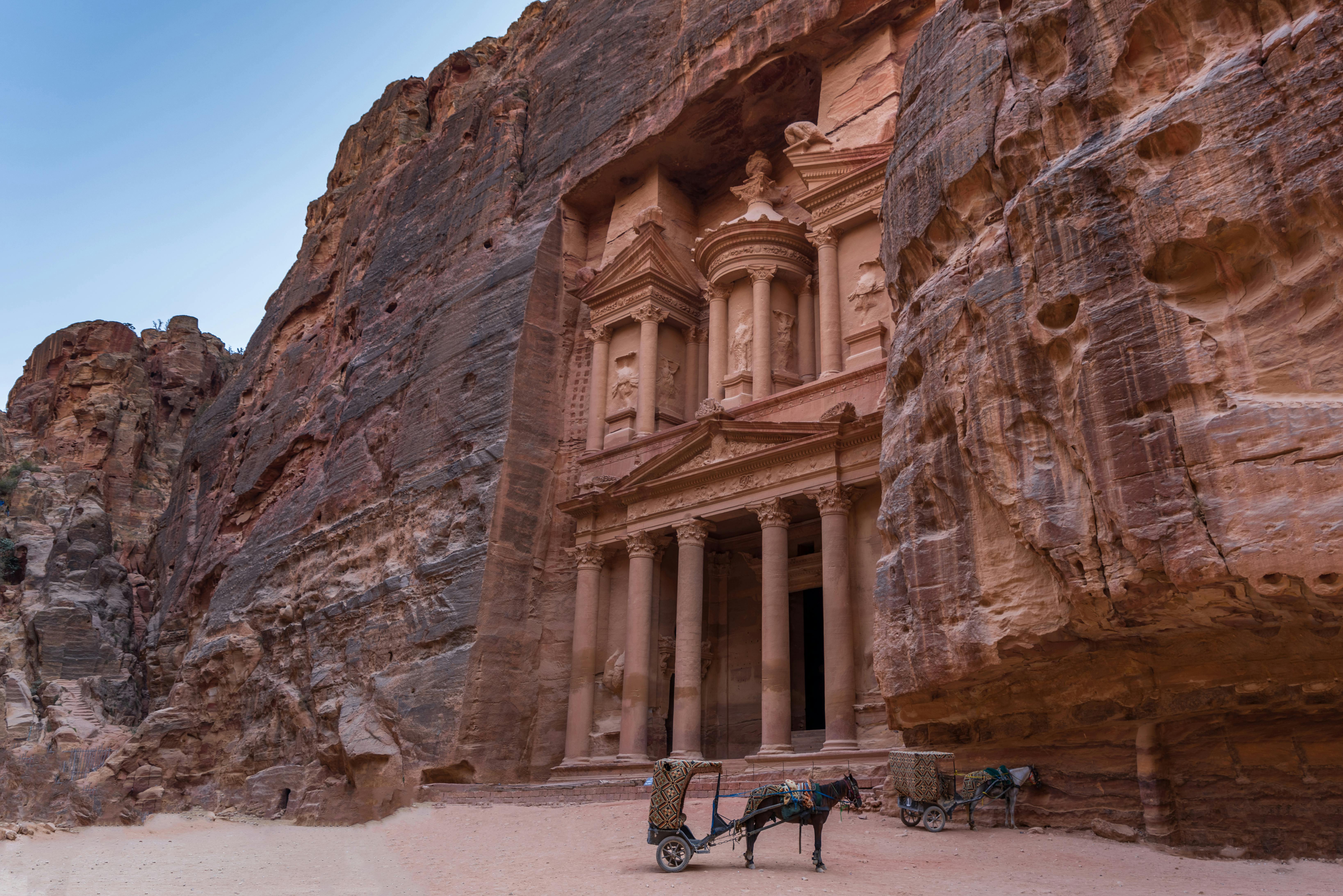
Best Itineraries:
3 Days:
- Day 1: Arrive in Amman, explore the city, visit the Citadel and Roman Theatre, or take a food tour
- Day 2: Take a bus to Petra, explore the ancient ruins, or take a guided hike
- Day 3: Return to Amman, visit the Dead Sea and float in the salty waters, or explore the historic district of Madaba
1 Week:
- Day 1-2: Amman, explore the city, visit the Citadel, Roman Theatre, and Rainbow Street, or take a day trip to Jerash
- Day 3-4: Petra, explore the ancient ruins, hike to the Monastery, or take a cooking class
- Day 5: Wadi Rum, take a bus to the desert, camp under the stars, or go on a jeep tour
- Day 6-7: Aqaba, relax at the beach, snorkel or dive in the Red Sea, or visit the ancient ruins of Ayla
2 Weeks:
- Day 1-3: Amman, explore the city, visit the Citadel, Roman Theatre, and Rainbow Street, or take a day trip to Jerash or Ajloun
- Day 4-6: Petra, explore the ancient ruins, hike to the Monastery, take a cooking class, or visit the nearby Dead Sea
- Day 7-8: Wadi Rum, take a bus to the desert, camp under the stars, go on a jeep tour, or visit the ancient ruins of Disi
- Day 9-10: Aqaba, relax at the beach, snorkel or dive in the Red Sea, visit the ancient ruins of Ayla, or take a day trip to the Sinai Peninsula
- Day 11-12: Dead Sea, float in the salty waters, visit the nearby ancient ruins, or take a spa day
- Day 13-14: Jerash and Ajloun, explore the ancient Roman cities, or visit the nearby forests and waterfalls
1 Month:
- Week 1: Amman, explore the city, visit the Citadel, Roman Theatre, and Rainbow Street, or take a day trip to Jerash or Ajloun
- Week 2: Petra, explore the ancient ruins, hike to the Monastery, take a cooking class, or visit the nearby Dead Sea
- Week 3: Wadi Rum and Aqaba, take a bus to the desert, camp under the stars, go on a jeep tour, relax at the beach, snorkel or dive in the Red Sea
- Week 4: Dead Sea and the King’s Highway, float in the salty waters, visit the nearby ancient ruins, explore the historic district of Madaba, visit the ancient city of Umm Qais
Top things to do:
North Jordan
- Explore the ancient Roman city of Jerash
- Visit the historic district of Ajloun and explore its charming streets and shops
- Hike through the stunning scenery of the Ajloun Forest Reserve
- Visit the ancient ruins of Umm Qais
- Explore the historic district of Irbid and visit the nearby ruins
- Take a hike through the stunning scenery of the Yarmouk Nature Reserve
- Visit the ancient ruins of Abila
- Explore the historic district of Beit Ras and visit the nearby shops and cafes
Amman
- Explore the historic district of Downtown Amman
- Visit the Citadel and Roman Theatre
- Wander through the vibrant markets and bazaars
- Check out the street art scene in the neighborhood of Jabal Amman
- Visit the Jordan Museum and learn about the country’s history and culture
- Explore the historic district of Rainbow Street and visit the nearby shops and cafes
- Take a hike through the stunning scenery of the Amman Hills
- Visit the ancient ruins of Qasr al-Abd
Central Jordan
- Explore the ancient ruins of Petra
- Take a hike through the stunning scenery of the Wadi Rum desert
- Visit the nearby Dead Sea and float in the salty waters
- Explore the historic district of Madaba and visit the nearby ruins
- Take a hike through the stunning scenery of the Mujib Nature Reserve
- Visit the ancient ruins of Mount Nebo
- Explore the historic district of Kerak and visit the nearby shops and cafes
- Take a hike through the stunning scenery of the Wadi Araba
South Jordan
- Visit the ancient ruins of Shawmari
- Explore the historic district of Quweira and visit the nearby shops and cafes
- Take a hike through the stunning scenery of the Wadi Rum desert
- Relax on the beach and snorkel or dive in the Red Sea in Aqaba
- Visit the ancient ruins of Ayla and explore the nearby markets
- Take a day trip to the Sinai Peninsula
- Explore the historic district of Tafilah and visit the nearby shops and cafes
- Take a hike through the stunning scenery of the Dana Biosphere Reserve
- Visit the ancient ruins of Feinan
- Explore the historic district of Ghor al-Safi and visit the nearby shops and cafes
East Jordan
- Explore the historic district of Mafraq and visit the nearby shops and cafes
- Visit the ancient city of Umm Qais and explore the nearby ruins
- Explore the historic district of Salt and visit the nearby shops and cafes
- Take a hike through the stunning scenery of the King’s Highway
- Visit the ancient ruins of Qasr Amra
- Explore the historic district of Azraq and visit the nearby shops and cafes
- Take a hike through the stunning scenery of the Wadi Sirhan
- Visit the ancient ruins of Qasr al-Hallabat
Food:
Jordan’s food scenario is in fact a reflection of the rich culture and history of the country. The moment one steps into Jordan, the aroma of fresh bread just out of the oven, coffee being roasted, and meat sizzling on the grill reaches out to them. Food, in Jordan, plays a great role in their hospitality, and mealtime is mostly viewed as a time to bond with family, friends, and at times with strangers too.
Traditional Jordanian food reflects influences from the Middle East, the Mediterranean, and Arabs. Other popular dishes include mansaf, a dish made with lamb cooked in yogurt sauce and then served with rice and bread; maqluba, a rice and vegetable dish cooked together in a large pot and flipped over when presented; and kibbeh-patties made from ground meat mixed with bulgur. One will also find falafel, shawarma, and kebabs, all made with fresh and locally sourced ingredients.
But it is not all about the food itself; it is an experience. Mealtime is generally loud and social in Jordan, filled with laughter, conversations, and most importantly, great food. Whether you dine with a local family on a home-cooked meal or grab a quick bite from a street food stall, you will find flavors and moments in food that are memorable.
And then, of course, there is the sweets – oh, the sweets! Jordanian pastries like baklava, kunafeh, and ma’amoul are famous for their sweet, sticky goodness, and are often served up with a strong cup of coffee or tea. Be sure to sample some of these sweets at a local bakery or café, where you can watch the pastry-makers at work and sample the freshest, most delicious sweets.
As you get into Jordan’s gastronomic life, you will almost immediately recognize the emphasis on fresh ingredients and local produce. From succulent tomatoes and cucumbers to herbs and spices full of fragrance, everything in every single bite speaks volumes of this country’s rich agricultural heritage. And with the Jordan River running across the heart of the country, fresh seafood is also well at hand.
But Jordanian food is not only about nutrition; it’s about culture and tradition, too. Meal times in Jordan are considered to be an important time to be able to bond with other people and show hospitality. When you would sit down to a meal, you often would be greeted with a warm smile and a generous serving of food. It is customary to eat with your right hand and to try a little bit of everything on your plate.
If you go further and deeper into Jordanian food, you will be slapped with community and sharing. In most instances, much of the food is served family-style, portions large in size are placed at the middle of the table and shared by all. This will allow you to try new dishes and bond with others over a delicious meal.
Complementing the scrumptious food, Jordan boasts of a variety of refreshing drinks that range in flavor from sweet and creamy to tangy and fruity. From the sweet, creamy taste of sahlab, a traditional Jordanian drink made with milk, sugar, and orchid root, to the tangy, fruity flavor of jallab, a popular drink made with dates, molasses, and rose water, there is something to satisfy every taste bud.
Also, be sure to try some of Jordan’s well-known desserts toward the end of the day. From the flaky, buttery pastry of knafeh-a traditional Jordanian dessert made with cheese, syrup, and phyllo dough-to the sweet, creamy taste of muhalabia, a dessert made with milk, sugar, and rose water-you’ll be treated to a sweet treat that surely will satisfy your cravings.
To put it in a nutshell, food in Jordan is just divine, with its plethora of flavors, textures, and smells. Be you a foodie, curious traveler, or avid eater, there’s something for everyone to love in Jordan. So come hungry, come curious, and come ready to indulge in all the delicious flavors Jordan has to offer!

Culture:
Jordanian culture is a very rich and colorful tapestry, merged from threads of history, religion, and tradition. Hospitality lies at the very heart, with warm welcomes being extended to visitors from every corner of the globe. For Jordanians, guests are one of the greatest blessings from Allah and are afforded respect and generosity beyond any imagination.
This manifests in the traditional Jordanian meal, which is a highly elaborate affair with many different dishes on display, including mansaf, maqluba, and kibbeh. These meals are generally set in a communitarian environment, with guests sitting around the table to share in the feast. This is a time for laughter, conversation, and connection and is a part of Jordanian culture.
Another significant constituent of Jordanian culture is religion, and the dominant one is Islam. Thus, the call to prayer reverberates through every part of the country through the mosques, and most Jordanians work religious activities into everyday life. Jordan is a very tolerant and receptive country, though, and people of all faiths are welcome.
Another significant part of Jordanian culture is traditional dress, something in which both men and women take a lot of pride. The long, white robe known as a dishdasha is common; women’s clothing often features beautiful embroidery among other fancy details.
Another aspect of Jordanian culture includes music and dance, the most spectacular of which is the traditional dabkeh dance. It is a very lively dance and is usually executed in weddings and celebrations, where dancers form a line holding hands and dance in uniform rhythm.
Aside from the above-mentioned traditional elements, Jordanian culture is influenced by the strategic location of the country, which has made it a crossroads for trade and cultural exchange for many centuries. This is reflected in everything, from architecture to food, due to the time-honored mix of Eastern and Western influences.
The history of the country also contributed much to the traditional Jordanian culture: from the ancient Nabataeans and Romans to more recent Ottoman and British empires, Jordan has represented a melting pot of cultures for thousands of years.
This rich history is reflected in a number of archaeological sites within the country, which form a significant part of the history dating back into the famous city of Petra, which was designated a UNESCO World Heritage Site. Petra testifies to the ingenuity and skill of the Nabataeans who, over 2,000 years ago, carved their city into the sandstone cliffs.
Besides the cultural and historic treasures, Jordan is a country of contrasts and breathtaking beauty. From the rolling hills and scenic valleys of the north to the vast deserts and rugged mountains of the south, Jordan’s diverse landscape is a haven for outdoor enthusiasts.
The capital city, Amman, with its traditional and modern elements of construction, is a busy metropolis. From the ancient Citadel and Roman Theatre to modern malls and restaurants, Amman is a city that has something for every taste.
In a nutshell, Jordanian culture is no less than a full-bodied tapestry infused with warmth, hospitality, and generosity. Rather a traditional culture, it is simultaneously open to newer influences and ideas. Whether one is a visitor or a resident, Jordan has something for everyone, and this is certainly one place where memories will linger on.
Accommodations:
In Jordan, as a poor backpacker, you are likely searching to find super cheap and locally-owned accommodations. Man, the hostels in Jordan are an adventure: forget all the fancy booking websites and book the cheapest ones for a crazy, weird, best experience. Seriously, man, it’s gonna be one of those nights.
The moment one steps into a hostel in Jordan, he is welcomed with a bright smile, and an invitation to come in is accorded with warmth. Many times, staff at the facilities are themselves travelers or locals interested in cultural and traditional hospitality for guests. Get ready to be offered a pot of steaming-hot tea or coffee and even a plate of freshly baked maqluba-a typical Jordanian meal.
The hostels themselves are usually tucked away into some small nook of major cities or right smack in the middle of rural villages. You might sleep on a mattress in a warm dorm room, or you might even be sleeping on a rooftop with the stars up above. Whatever it is, prepare for some bonding time-serious bonding time-with your fellow travelers.
It’s not just the accommodation, though; it’s about all the experiences that come with it. In Jordanian hostels, you are mostly swept by impromptu jam sessions, cooking classes, or even a spontaneous game of soccer with locals. And most of the time, you’ll be invited to a traditional Jordanian feast or two, or three, or four.
Of course, there are then the more.colorful experiences. Like the time you might find yourself sharing a bathroom with a few too many fellow travelers, or the great “mattress swap” of 2023-to this day I ask myself how that happened. But hey, that’s all part of the fun, right?
Not only does the hostel scene in Jordan offer a place to lay your head, but it’s also about embracing local culture, making lifelong friends, and creating memories that one will never forget. Book that room cheap and get ready for the wildest ride of your life.
As you navigate the hostel scene in Jordan, you’ll begin to notice a few things. First of all, personal space is a rather.relaxed notion here. Be prepared to share your room, your bathroom, and even your bed with other travelers. Second, locals are much friendlier and often invite guests to join in for family gatherings or traditional celebrations. Lastly, the food – oh, the food – is great. Be prepared to gain a few pounds, for you will be eating your weight in delicious Jordanian cuisine.
Nevertheless, despite the chaos and unpredictability that is Jordan’s hostel scene, it does have a certain charm to it. Maybe it’s the fact that you simply just never know what you’re truly getting yourself into, or maybe it’s the sense of community that develops amongst travelers and locals alike. Whatever it is, it’s addictive-and you’ll find yourself wanting more.
So, for an ultimate Jordanian experience that you would not want to miss out on, skip those elegant hotel reservations and go for the most economical hostel room. Believe me, you shall never regret it.
Nightlife:
Variety and eclecticism mark Jordan’s nightlife, from very traditional to hyper-modern, which fits each and every taste and style. From the busy streets of Amman to the casual bars of Aqaba, nightlife in the country is truly a reflection of the warm and welcoming culture that this country owns.
As evening falls, Jordan’s streets become alive with the sounds of music, laughter, and chatter. In Amman, the capital city, nightlife morphs into a combination of Arabic and Western influences, from hip cocktail bars to traditional tea houses. You could sip refreshing mint tea in a cozy cafe or dance the night away to the latest Arabic pop hits.
But Jordan’s nightlife is not limited to the capital. In the coastal town of Aqaba, life is slow-paced, relaxed, and highly beachy; bars and clubs overlook the Red Sea. You might spend your evening watching the sun go down over the water or enjoying a cold beer at a beachside bar.
Food and drink feature prominently in most nightlife around the country. Meze-small plates of food-are a staple of Jordanian socializing, and you’ll find yourself often munching delicious treats like hummus, tabbouleh, and falafel as you sip on a drink or chat with friends.
Despite Jordan’s conservative reputation, its nightlife is rather liberal and warm. You would be surprised to notice how many mixed-gender bars and clubs you come across and how eager the locals are to get acquainted with and socialize with foreigners.
Of course-as anywhere in the world-there exist some cultural norms. For example, showing affection in public is not common and at all times decent apparel is required when one happens to find themselves in conservative areas.
All in all, Jordan’s nightlife is a real treasure, with something to suit every interest and style. Whether you’re looking for a laid-back evening among friends, a romantic night out, or an uninhibited party, you’ll find it in Jordan. So why not come and see for yourself?
As you go on to experience Jordan’s nightlife, you’ll start noticing a few things. First, the locals are very hospitable and will constantly invite you to have a drink or a meal with them. Second, the eclectic music runs from traditional oud playing to modern electronic beats in a true Arabic-Western fusion. And third, well, the food is simply incredible. Be prepared for some weight gain, though, as you will be having to your fill of delicious Jordanian dishes.
But despite the endless wonders of Jordan’s nightlife, a number of stumbling blocks, too, have to be considered. To begin with, there is, for instance, a dress code that is moderately conservative in Jordan, and one may expect its visitors to turn up decently at all times. Second, transportation options may not be as readily available during nights, and taking good care to make advance arrangements for an available taxi or carpool would not be a bad idea at all.
On the whole, however, Jordan’s nightlife is something else; it’s unique and memorable to people from all over the world. So why not come and see for yourself? Book a ticket, grab a drink, and get ready to dance the night away in this incredible country.
Backpacking Jordon costs:
Daily Budget
- Accommodation
- $10-15 per night (hostel or shared room)
- Food
- $5-10 per day (street food, falafel, shawarma)
- Transportation
- $2-5 per day (public transportation, hitchhiking)
- Attractions
- $5-10 per day (free walking tours, visiting local markets)
- Total
- $22-40 per day
Weekly Budget
- Accommodation
- $70-105 (avg. $10-15 per night)
- Food
- $35-70 (avg. $5-10 per day)
- Transportation
- $14-35 (avg. $2-5 per day)
- Attractions
- $35-70 (avg. $5-10 per day)
- Total
- $154-280 per week
Conclusion:
Traveling Jordan on the budget seems like a daunted task, but this can be a very receptive place once the right amount of planning and insider knowledge has been attained. By embracing affordable accommodation, street food delights, and public transportation, the broke backpacker can soak up in Jordan’s rich history, breathtaking landscapes, and warm hospitality.
From the magnificent ruins of Petra to the tranquil waters of the Dead Sea, to the bustling streets of Amman, a time spent in Jordan is a blend of unique adventure and richness in culture. For the economically savvy traveler, daily expenses of $22-40 and weekly expenses of $154-280 can build unforgettable experiences.
Jordan is the place to go for any backpacker who wishes to have an unforgettable experience of travel right through the middle of the Middle East-accommodative atmosphere and prices included. So now, pack lightly and plan wisely to have an unforgettable adventure across this land of enchantment!
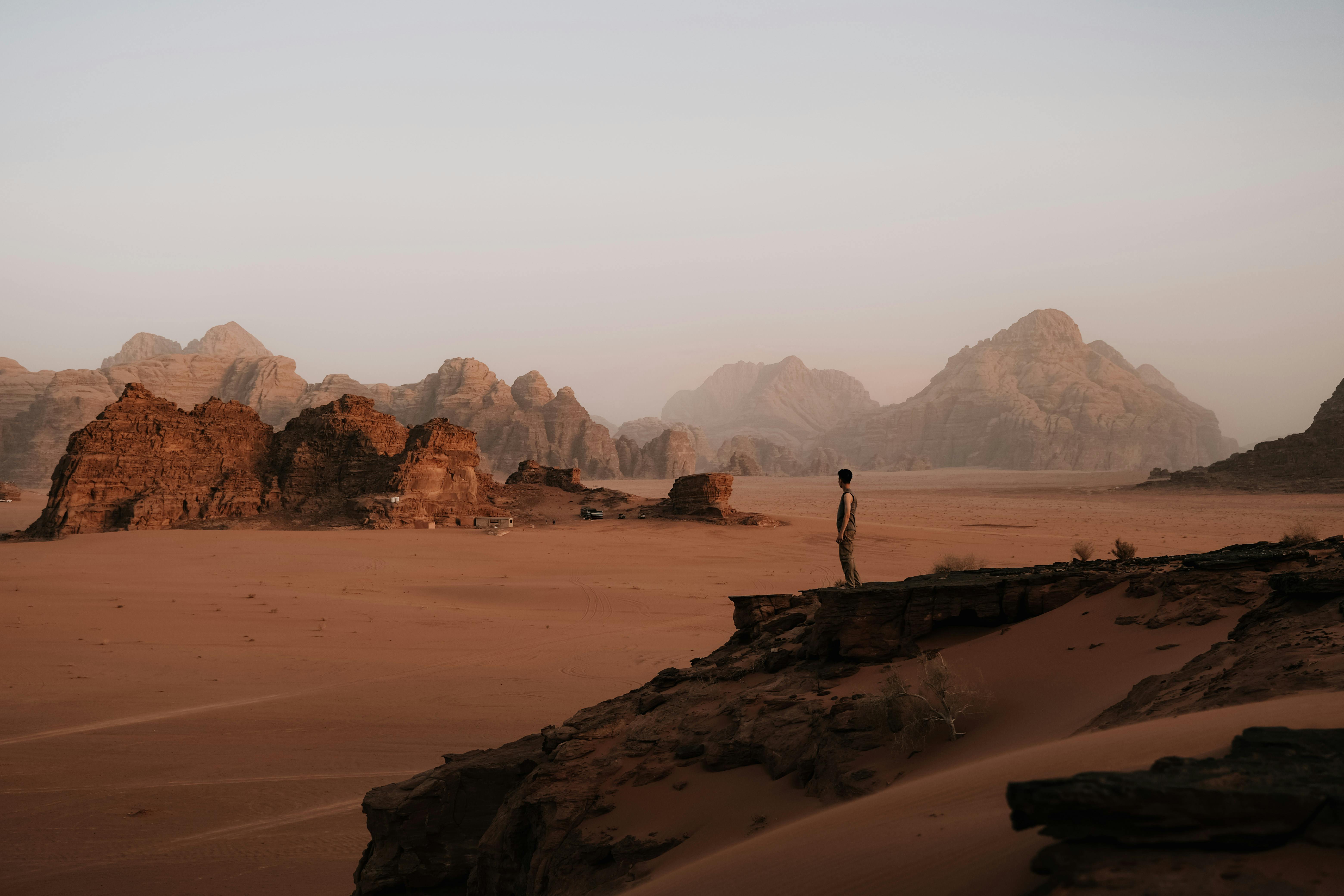
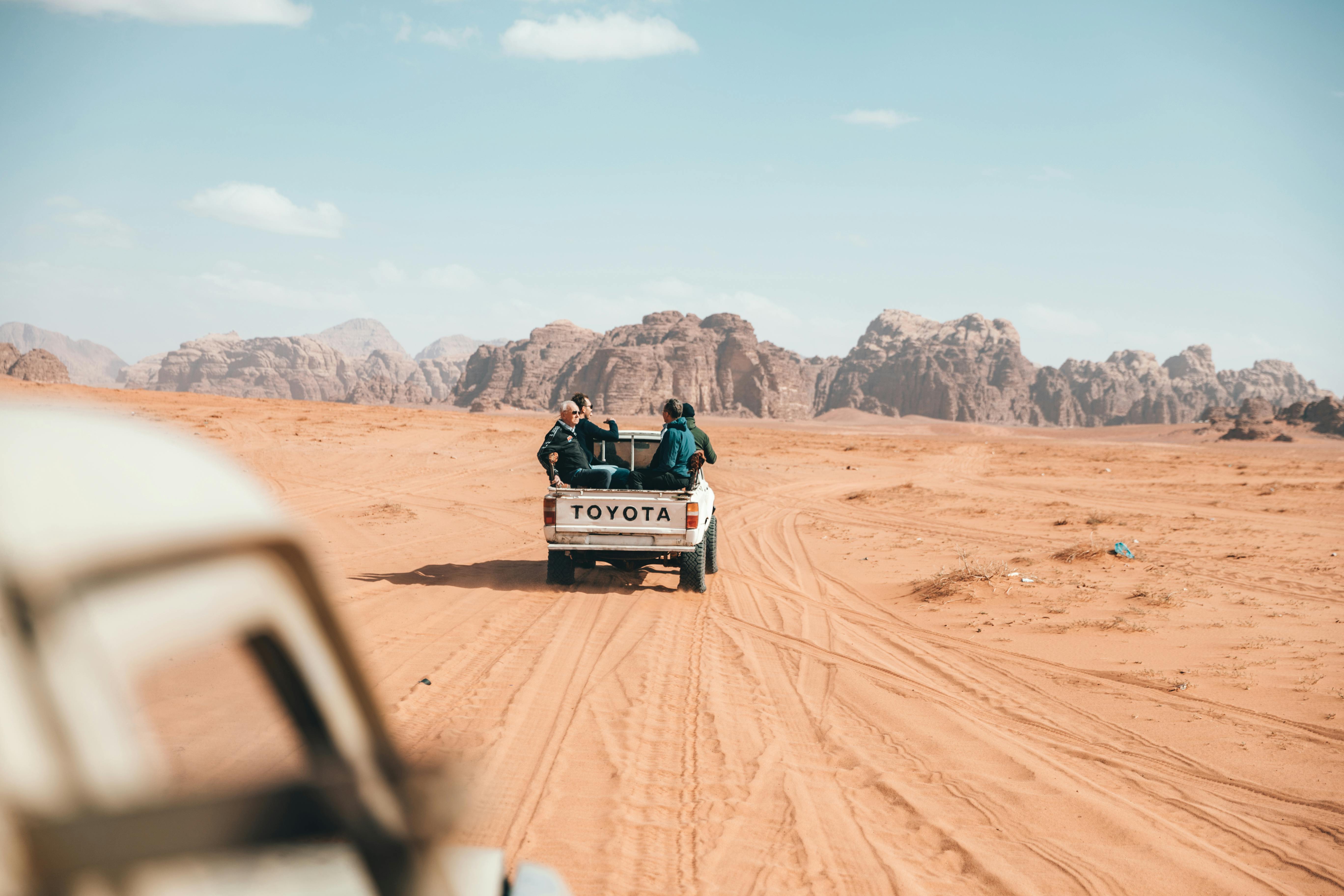
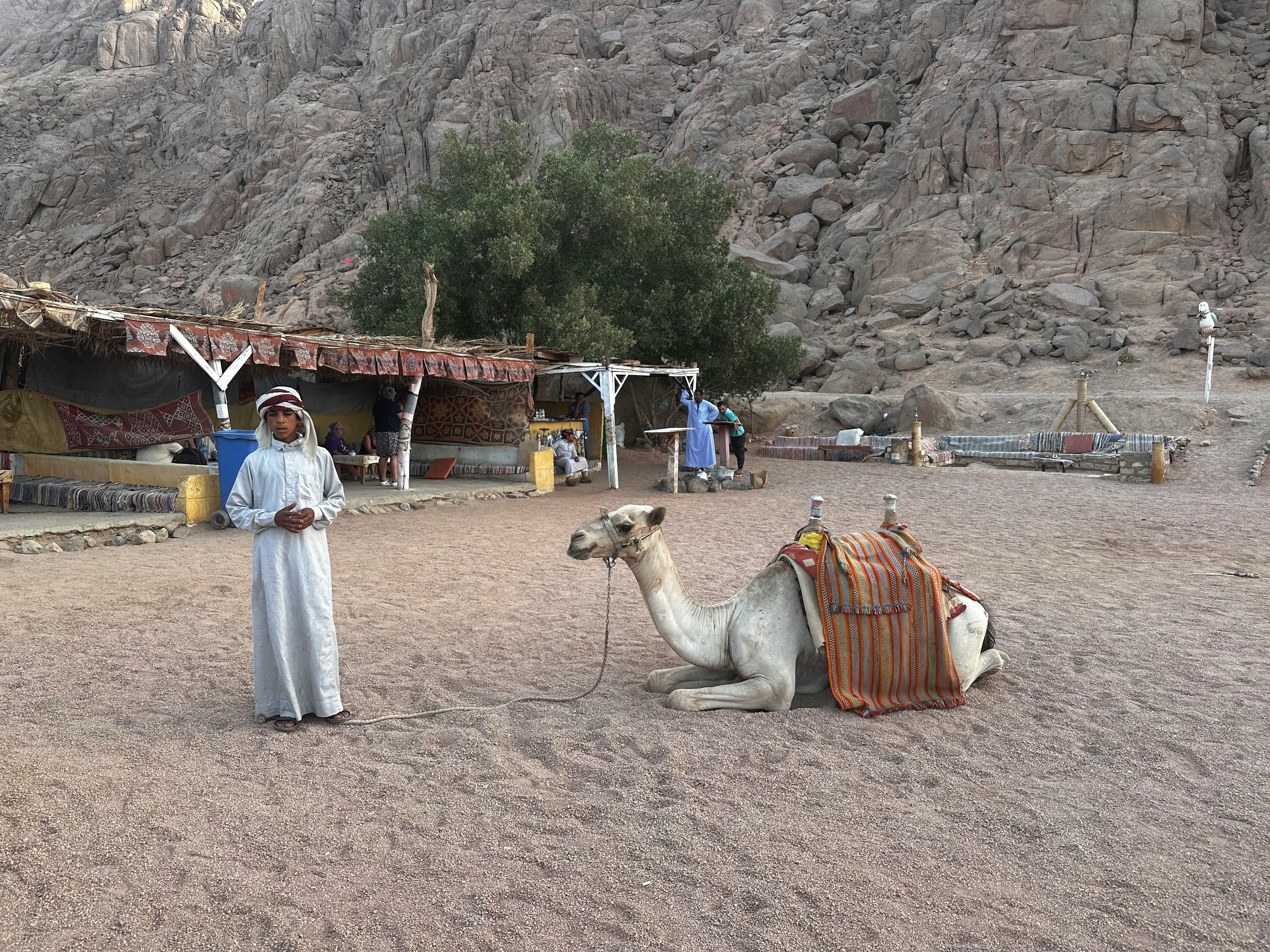
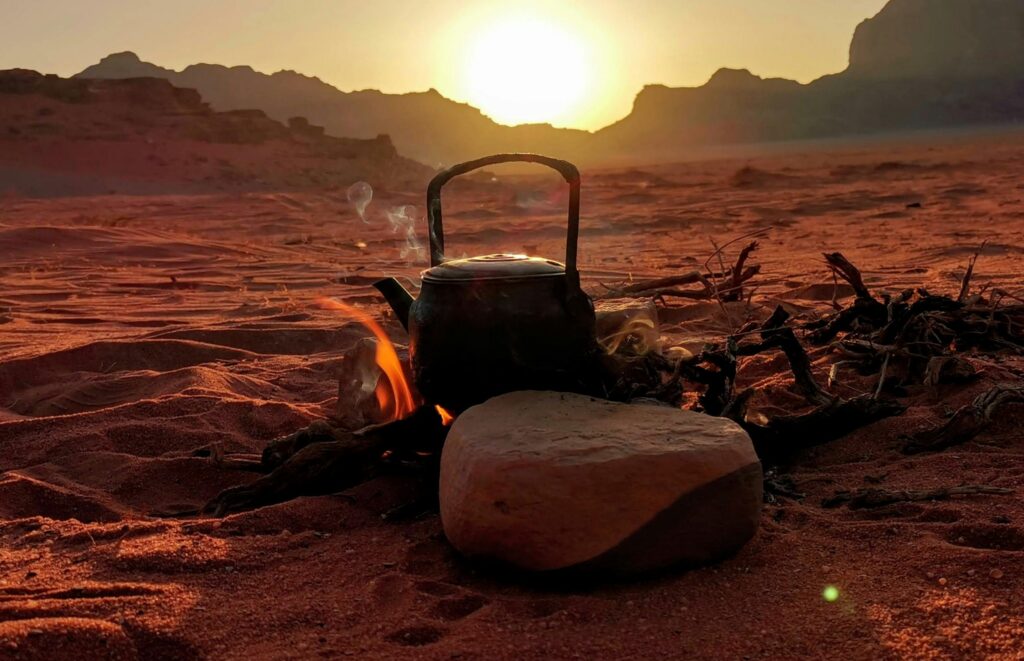

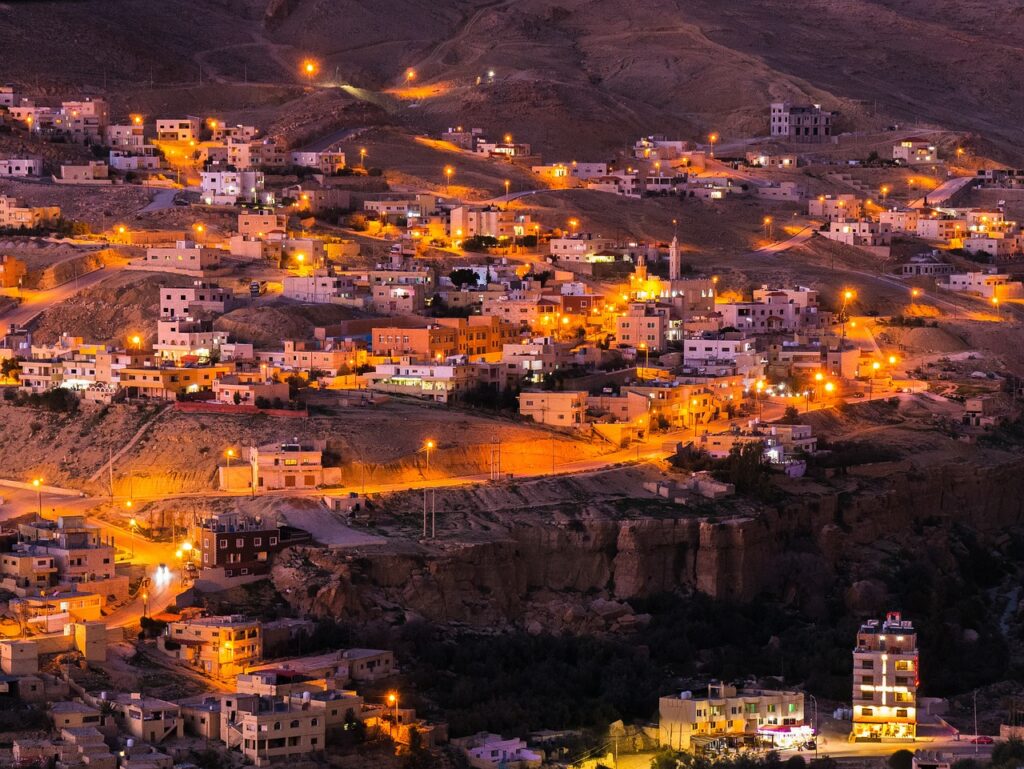
Thx so much